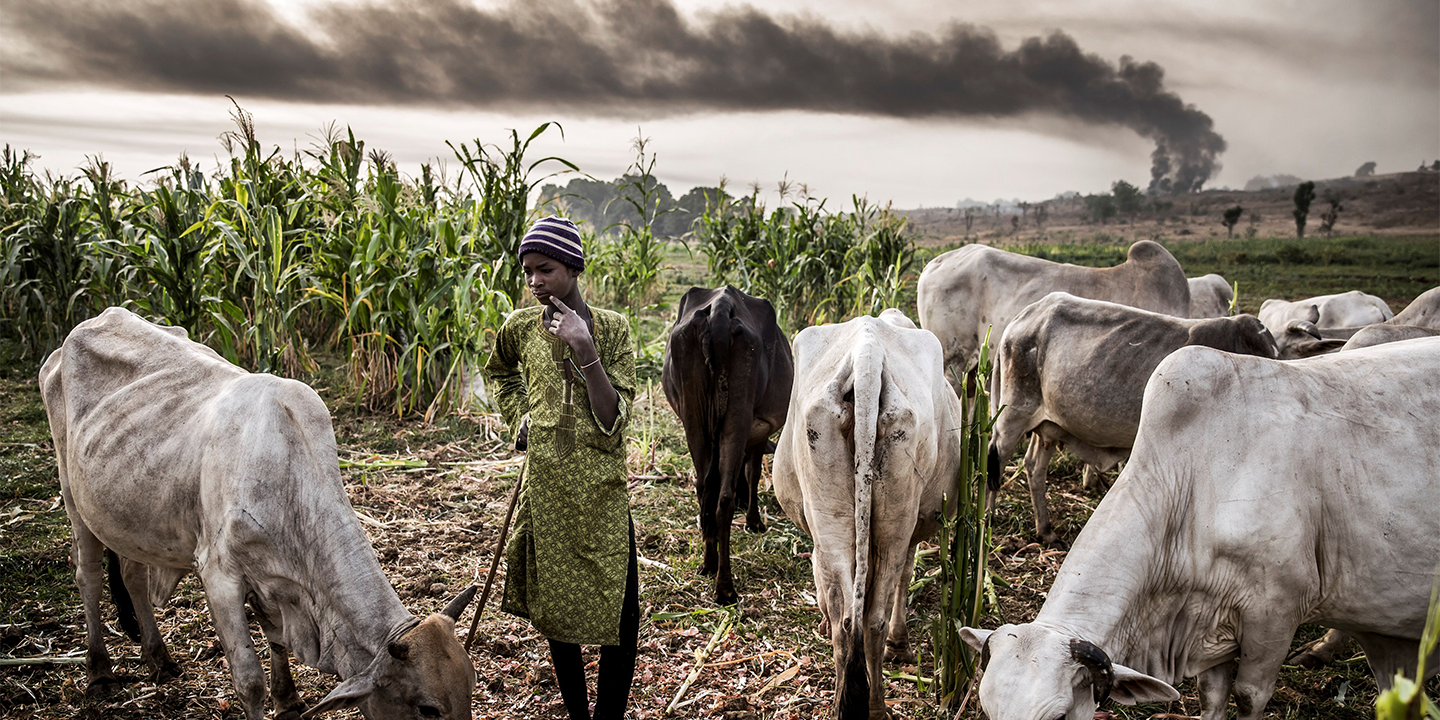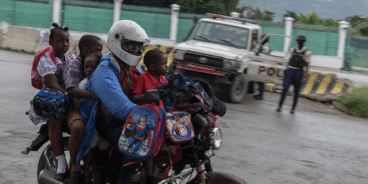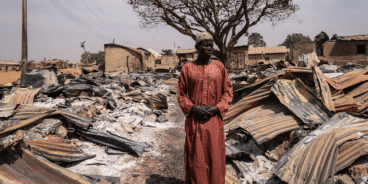

Atrocity Alert No. 444: Nigeria, Haiti and South Sudan
Atrocity Alert is a weekly publication by the Global Centre for the Responsibility to Protect highlighting situations where populations are at risk of, or are enduring, mass atrocity crimes.
ESCALATING ATTACKS IN CENTRAL NIGERIA SPARK FEARS OF ATROCITY CRIMES
Between 13 and 14 June at least 150 people were reportedly killed in an overnight assault on Yelwata village, in Nigeria’s Benue State, by unidentified gunmen. Survivors describe entire families being burned alive in their homes, with many others injured or missing. Many of those killed had been seeking refuge in the village market after fleeing violence in other parts of the state. No group has claimed responsibility to date.
This massacre is the latest in a series of escalating attacks in Benue, with violence marked by extreme brutality and impunity becoming increasingly common in the region. In May at least 42 people were killed in a series of coordinated assaults, during which gunmen also destroyed critical infrastructure, including bore holes, clinics, schools, places of worship and grain reserves.
Violence has also surged in neighboring Plateau State, where over 100 people have been killed in recent months. According to Amnesty International, between 27 March and 2 April coordinated attacks targeted five communities in Bokkos Local Government Area.
Benue and Plateau, located in Nigeria’s Middle Belt, have long experienced conflict rooted in disputes over land and water access between herders and farmers. These tensions are often compounded by overlapping ethnic and religious divisions. Climate change and desertification in the north have pushed predominantly Fulani Muslim herders south into farmlands occupied by mostly Christian communities, intensifying competition. The Boko Haram insurgency has further exacerbated these challenges by driving herders into the Middle Belt, increasing pressure on already fragile inter-communal relations.
This volatile context has enabled the proliferation of armed groups and criminal gangs, including so-called “bandits,” who operate with near-total impunity. These groups have engaged in widespread murder, rape, kidnapping and looting across the Middle Belt. Amnesty International reports that over the past two years, at least 6,896 people have been killed in Benue and 2,630 in Plateau, while hundreds of thousands have been displaced.
The Middle Belt – particularly Benue state – is one of Nigeria’s key food-producing regions. Farmers have been among the most affected by the latest attacks across Benue and Plateau, and armed groups have begun occupying farmland and obstructing agricultural activity, contributing to a looming food security and humanitarian crisis.
President Bola Tinubu stated, “Enough is enough… I have directed the security agencies to act decisively, arrest perpetrators of these evil acts on all sides of the conflict, and prosecute them.” While this statement signals a strong stance from the federal government, urgent follow-through is needed to prevent further atrocities and restore security.
The Nigerian government must act urgently to stop the violence in the Middle Belt, hold perpetrators accountable and protect vulnerable communities. Military deployments must be matched with coordinated federal and state strategies and sustained efforts to address the root causes of violence, including poor governance, environmental degradation and deepening poverty.
UN OFFICIALS SOUND ALARM AS GANG VIOLENCE AND ATROCITIES SURGE IN HAITI
On 13 June UN High Commissioner for Human Rights Volker Türk raised alarm that Haiti is plunging further into turmoil, with gangs expanding beyond Port-au-Prince and into the Centre and Artibonite departments, carrying out unspeakable horrors and causing immense suffering. Between 1 January and 30 May over 2,680 people were killed, at least 957 others injured and 316 kidnapped for ransom. High Commissioner Türk stressed, “Alarming as they are, numbers cannot express the horrors Haitians are being forced to endure on a daily basis.”
Since the beginning of the year, reports of sexual violence – particularly rape and gang rape – and recruitment of children also continue to rise. On 4 June the UN reported an alarming surge in sexual slavery, further exemplifying the brutal oppression of women and girls. The Special Representative of the Secretary-General on Sexual Violence in Conflict, Pramila Patten, condemned the “widespread atrocities,” including sexual violence, which is being used by gangs “deliberately and systematically” to assert dominance and punish communities in gang-controlled territory. Survivors are often assaulted in their own homes or public spaces.
Vigilante and so-called self-defense groups – formed to protect communities, often with tacit police support – have also perpetrated abuses and indiscriminate violence. High Commissioner Türk highlighted a brutal attack that unfolded at the end of May in Préval, Artibonite department, during which local self-defense brigades set fire to homes, raided a church and beheaded several people in the congregation. At least 55 people died in the massacre, and 23 others have not been accounted for.
Meanwhile, on 11 June the UN’s Economic and Social Council and the Peacebuilding Commission held a meeting examining how peace and stability can return to Haiti. The meeting discussed ways of consolidating peace at the local level and violence reduction, particularly through the involvement of women and youth in local initiatives. During the meeting, Philémon Yang, President of the UN General Assembly, said, “The scale of suffering in Haiti is escalating at a pace that demands not just our attention, but our action… The responsibility lies with all of us.”
The transitional government and its international partners must live up to their legal obligations and stated commitments to Haiti’s women and girls by prioritizing their needs in their policies, programs and budgets. States in the region must end the forced returns of Haitians and fully enforce the arms embargo. Ending impunity is a fundamental step for breaking the cycle of violence. The recent adoption of a decree establishing two Specialized Judicial Units, including one focused on mass crimes, and the reopening of the Court of First Instance of Port-au-Prince, marks critical progress toward accountability and restoring the rule of law. These judicial units should be immediately operationalized.
INTER-COMMUNAL VIOLENCE INTENSIFIES IN TONJ EAST, SOUTH SUDAN
On 3 June the UN Mission in South Sudan (UNMISS) reported a sharp escalation in inter-communal violence in Tonj East, Warrap State, resulting in more than 80 casualties, though numbers are yet to be verified. The surge in violence – largely driven by retaliatory attacks and cattle theft – marks a dangerous intensification of conflict in Tonj East. Since September a vicious cycle of cattle raiding and revenge attacks across diverse communities has caused a significant loss of life, widespread property destruction and large-scale livestock theft. The situation in Tonj East has remained volatile, with UNMISS reporting that over 200 people were killed by inter-communal fighting in March alone. UN Deputy Special Representative of the Secretary-General, Guang Cong, warned that “urgent intervention is needed from the national Government to prevent the conflict from escalating to catastrophic levels and to bring communities together to peacefully resolve grievances.”
Historically, conflicts in Tonj East have involved internal and cross-border dynamics. Tonj East’s rich grazing land and water points have drawn pastoralist communities to the county during the dry season. The area is divided between the Luanyjang groups in the northeast and the Rek Dinka, who are part of the Greater Ananatak communities in the southwest. The Luanyjang have also clashed with the Haak Nuer in the past over access to pasture in the border areas of Warrap and Unity states, though widespread flooding in 2020 resulted in a decrease in clashes. However, violence with the neighboring Agar and Gok Dinka communities in Lakes State has persisted. Internal tensions between the Luanyjang and Greater Ananatak intensified following a failed disarmament campaign.
Since February 2025 South Sudan has seen a broader escalation in violence, including recent clashes between government forces and opposition groups, triggering widespread displacement and worsening the humanitarian crisis. The situation further deteriorated following the house arrest of First Vice President Riek Machar and the detention of other key political figures – developments that risk fueling inter-communal tensions. The UN has warned that the country is on the brink of renewed civil war. In April UN Special Representative Nicholas Haysom stated the situation is “darkly reminiscent of the 2013 and 2016 conflicts, which took over 400,000 lives.”
The international community must prioritize diplomatic efforts to de-escalate tensions and address the underlying political and ethnic divisions contributing to the conflict. In Tonj East, efforts must focus on initiating inclusive local dialogue and reconciliation processes – particularly with community leaders and youth groups – to address and resolve root causes of conflict, including resource disputes, land ownership and historical grievances.
Related Content


Atrocity Alert No. 470: Haiti, Israel and the Occupied Palestinian Territory and Venezuela
